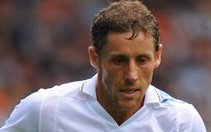Alan Woodward- App 536 Goals 158
United`s top post-war goal scorer Alan ‘Woody` Woodward had everything pace, skill and was lethal from a dead ball situation. Woodward was an old style winger that loved the ball at his feet and would come inside to grab more than the odd goal with a record of nearly one goal every three games from midfield. He heads the list of United players that were overlooked for an England cap. With Don Revie as England manager Woodward`s technical ability did not fit into Revie`s football philosophy even though he was consistently a top performer in his position during the 60s and 70s. A fourteen year career with United began with a goal in the county cup final against Barnsley in 1963 and ended at the end of the 78-79 season before leaving to play in the USA with the Tulsa Roughnecks. He will always be remembered by Blades fans of today through the lyrics ‘We ain`t got a barrel of money but we`ve got Woodward and Currie`.
Tony Currie- App 313 Goals 54
You would be hard pushed to find a Sheffield United fan that disagrees with the statement ‘Tony Currie was our greatest ever player`. Even now his name is talked about not only in United circles but around the country as being one of the greatest creative midfielders England has produced. He was the creative force behind all United did well in the 70s and embodies what United were all about in that era, playing attractive attacking football. He formed an impressive partnership with the more industrious Trevor Hockey whose role took on the mantra of ‘win it, give it to Currie`. His unlimited energy combined with an untouchable passing range quickly propelled him to legend status at the Lane. He is talked of as fondly by Leeds fans, where he played after leaving United in 1976. Like Woodward his face often didn`t fit in the England set up but despite this he did still win 17 caps in 7 years. His work in the community for the Blades after his career ended has cemented his place as one of Sheffield`s finest.
Michael Brown- App 151 Goals 28
‘Oh Lord Michael Brown!`. Quite aptly Neil Warnock`s first signing; ‘Browny` was a tigrish midfielder that did well to combine a competitive edge with bundles of ability. Arriving at the Lane from Manchester City Brown`s career had stalled somewhat, but at the Lane he reignited it. He suffered from the lack of quality around him as his first few seasons were highly without incident and Blades settled for mid table mediocrity. However, it was the 2003-2004 season where Brown made his greatest impact. With his midfield partner coming in the form of experienced Stuart McCall, Brown was given a more attacking role in one of United`s most successful teams of recent times. Brown was integral to this success and his twenty goals that season could have allowed him to create a goal of the season competition all on his own. After leaving united for Tottenham Brown was a regular in Premier League Sides but in a more defensive capacity. Nevertheless it will be for the 2003-2004 season Brown will be most well remembered and it is for this season alone Brown deserves a spot in the greatest team.
If you disagree watch this video http://www.youtube.com/watch?v=HYbbAxWur40
Jimmy Hagan- App 361 Goals 117
In a career that was largely affected by the war Hagan`s record of goals and appearances still stands up as one of United`s best ever. He gave twenty years of service at Bramall Lane in a career that began in 1938 and ended when he was offered a chance to play in Portugal in 1958. He helped secure the Blades promotion with 11 goals in his first full season as a player with the rest of his time being largely shared between first and second division campaigns. One of the many footballers of the time that due to the war was prohibited an international career, picking up only one cap against Denmark in 1948. He will also be remembered for turning down a move to Wednesday for a then British transfer record after the war. His managerial career after his playing days were over and he led Benfica to domestic and European success in the 70s. Hagan died in 1998 aged 80.
Share this article
